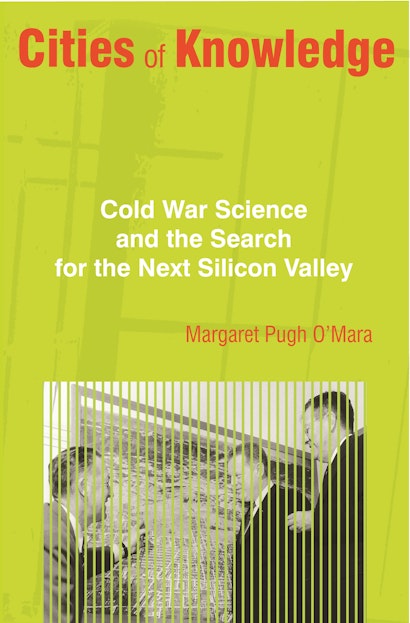What is the magic formula for turning a place into a high-tech capital? How can a city or region become a high-tech powerhouse like Silicon Valley? For over half a century, through boom times and bust, business leaders and politicians have tried to become “the next Silicon Valley,” but few have succeeded. This book examines why high-tech development became so economically important late in the twentieth century, and why its magic formula of people, jobs, capital, and institutions has been so difficult to replicate. Margaret O’Mara shows that high-tech regions are not simply accidental market creations but “cities of knowledge”—planned communities of scientific production that were shaped and subsidized by the original venture capitalist, the Cold War defense complex.
At the heart of the story is the American research university, an institution enriched by Cold War spending and actively engaged in economic development. The story of the city of knowledge broadens our understanding of postwar urban history and of the relationship between civil society and the state in late twentieth-century America. It leads us to further redefine the American suburb as being much more than formless “sprawl,” and shows how it is in fact the ultimate post-industrial city. Understanding this history and geography is essential to planning for the future of the high-tech economy, and this book is must reading for anyone interested in building the next Silicon Valley.
Margaret Pugh O'Mara teaches history at Stanford University. The dissertation this book is based upon won the Urban History Association's award for Best Dissertation in Urban History completed in 2002.
"Margaret O'Mara's book shows how very far from simple was US experience when dissected in detail and how very hard it was in reality to emulate Silicon Valley/Stanford success even for other American cities. This is a very interesting book. And a very timely one. It is refreshing to read a book with the historical perspective that policymakers and analysts alike too often lack."—Jane Marceau, Australian Review
"O'Mara's study is richly wrought, and her emphasis on place adds an important new dimension to discussions of Cold War political economy and its legacies."—Daniel Lee Kleinman, Journal of American History
"Can American cities survive in the twenty-first century? Margaret Pugh O'Mara puts forth a blueprint, not only for their survival, but one that could lead to an economic resurgence that restores cities to their traditional leadership role."—Edward G. Rendell, Governor, Commonwealth of Pennsylvania
"Margaret Pugh O'Mara has written a timely and brilliant exposition of the powerful forces that helped create the great suburban 'centers' of America's knowledge economy. This book is essential reading for every American metropolis imagining a high-tech future."—Bruce Katz, Director, Center on Urban and Metropolitan Policy, The Brookings Institution
"An original, compelling, and important book, Cities of Knowledge is at once a work of deep empirical research and of creative interpretation. O'Mara's study will make major contributions to economic history, political history, and the cultural history of suburban development in post-World War II America."—Bruce Schulman, author of From Cotton Belt to Sunbelt: Federal Policy, Economic Development, and the Transformation of the South, 1938-1980
"O'Mara tells you why the search for the next Silicon Valley has been so difficult and so important. By placing the history of Silicon Valley and its would-be imitators in Philadelphia and Atlanta into a larger history of postwar America, she challenges us to think about whether conventional cities can compete with emerging cities of knowledge and if so, on what terms. Urban planners may not find her four lessons easy to implement, but they have plenty to learn from them."—Stuart W. Leslie, author of The Cold War and American Science
"Cities of Knowledge is an important work that reframes our understanding of the relationship between science, metropolitan development, and the Cold War state. O'Mara's creative synthesis of international, national, regional, and local perspectives combined with her explication of the tension between public and private development charts a course for future work in this field."—Brian Balogh, University of Virginia, author of Commercial Nuclear Power, 1945-1975


